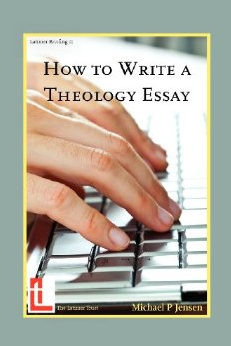 Michael P. Jensen’s book “How to Write a Theology Essay” could prove to be a valuable resource for anyone wishing to help people grasp true things about God. Each of the twenty chapters ends with a bullet-point summary (though there is more to the book than the summaries):
Michael P. Jensen’s book “How to Write a Theology Essay” could prove to be a valuable resource for anyone wishing to help people grasp true things about God. Each of the twenty chapters ends with a bullet-point summary (though there is more to the book than the summaries):
1. How not to lose heart before you start
•The topics of theology really matter
•The knowledge of God is not the preserve of the very clever
•Starting to write theology is a challenge that can be fun!
2. What is theology in any case?
•Theology is a species of reason, subject to the Word of God
•Theology is a form of speech
•Theology is evangelical: it is about God and his deeds
•Theology is evangelistic: it is an invitation to submit to the Lordship of Christ
3. What is a theology essay?
•An essay is an invitation to persuade
•The object of the theology essay is to say true things about God
•The theology essay deals with ideas and concepts
•It is not merely a summary of Scripture
4. The responsibility of theology
•Theology is answerable to God and must be done with prayerful reverence
•Theology is best done in service to God and his people
5. Choosing the question
•Choose a topic that interests you, but look carefully at the question
•Avoid a topic that is a contemporary church controversy where possible
•Consider what others are doing
6. Analysing the question
•What higher level task am I being asked to do, explicitly or implicitly?
•Am I being asked to find a cause or a purpose, or trace a connection, or describe something?
•What is the measure I am being asked to use, explicitly or implicitly?
•Where is my question located in the context of the ongoing theological conversation?
•Are there any extra features of the question that I have to take into account?
7. Beginning to think about it
•Get your brain moving early on
•What different ways of answering the question are there?
•Do some preliminary quick reading to orient yourself to the topic
8. Brainstorming
•Get everything you can think of down on paper in no particular order
•What thinkers might be relevant? Especially look for potential opponents
•What passages of Scripture might be worth investigating?
9. How to read for theology essays (and what to read)
•Read to gain basic information
•Read to gain nuance and subtlety
•Read to develop arguments
•Read to find stimulating conversation partners and ‘surprising friends’
•Read to find out what the opposition says
10. Using the Bible in theology essays
•You have to read Scripture as a whole to do theology biblically
•Orthodoxy helps you to read Scripture theologically
•Avoid prooftexting and word studies
11. How to treat your opponents
•Treat your opponents with respect
•Avoid cheap shots and caricature
12. Some advice on quoting
•Use quotations sparingly
•Quote if:
•The author nailed it
•You want to prove your opponent really does say that
•You are expounding a view to learn from it
•Quote SHORT
•Quote faithfully to the author
13. Types of argument for your essay
•Volume knobs, not on/off switches
14. The classic introduction
•Your introduction should set the scene and frame the question
•Your introduction should state your answer to the question
•Your introduction should give an indication of how you are going to answer the question
15. Why presentation matters, and how to make it work for you
•Presentation does matter
•The essential principle: don’t distract your reader
16. How to write well in a theology essay
•Be a reader of great writing
•Don’t be afraid of metaphors
•Learn the simple rules of English punctuation
•Be clear, and avoid vague words
17. The art of signposting
•Use headings
•Use summative sentences
•Use questions that flow
18. Bringing home the bacon
•Your conclusion should add nothing new
•Make sure you have fulfilled any promises you have made
•If you do have some space, consider the implications of your essay for other areas of theology
19. What to do with it now
•Don’t be shy about thinking of ways in which your essay could have a second life
20. A footnote about footnotes
•Use footnote commentary sparingly
•Don’t hide extra words in your footnotes
•Take care that the footnote relates clearly to the text
•Use footnotes to protect yourself by showing that you have read widely
HT: Andy Naselli
